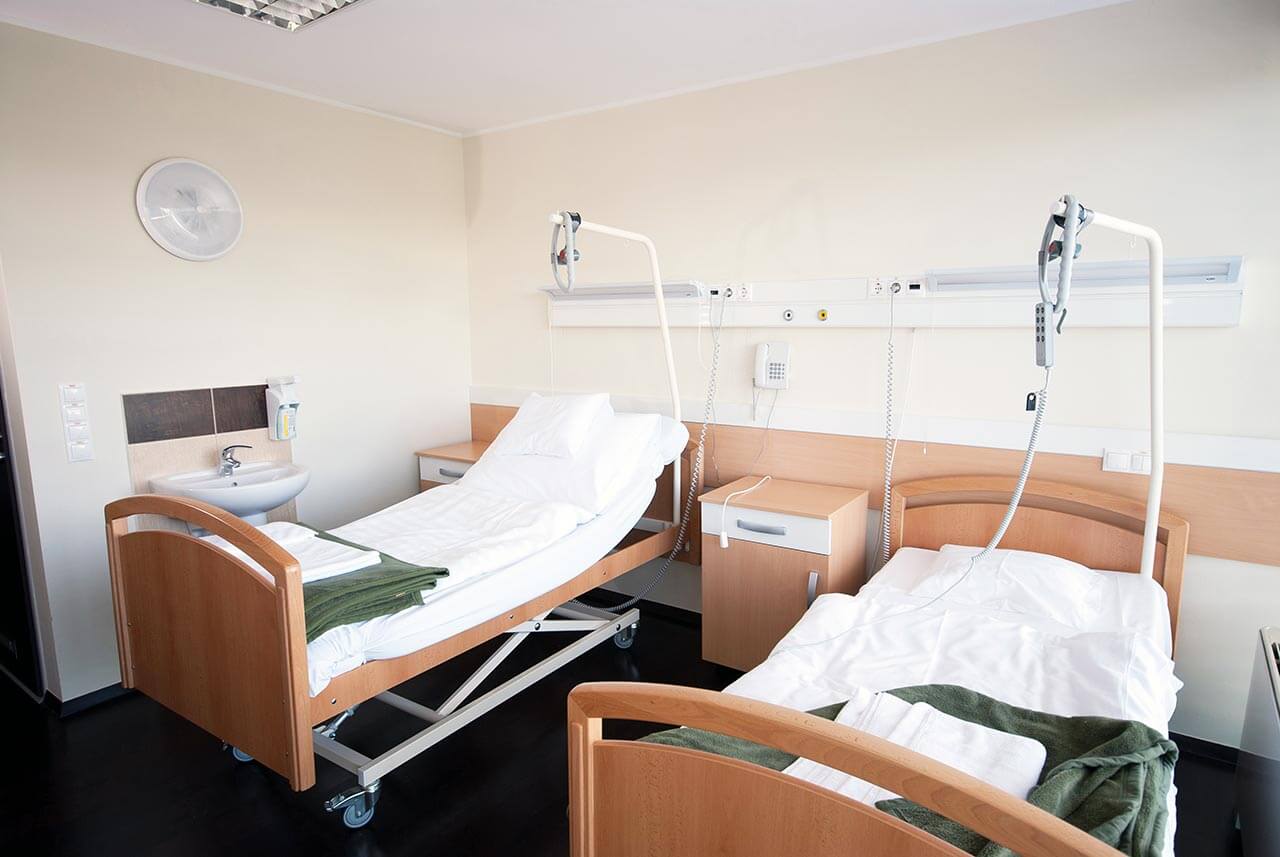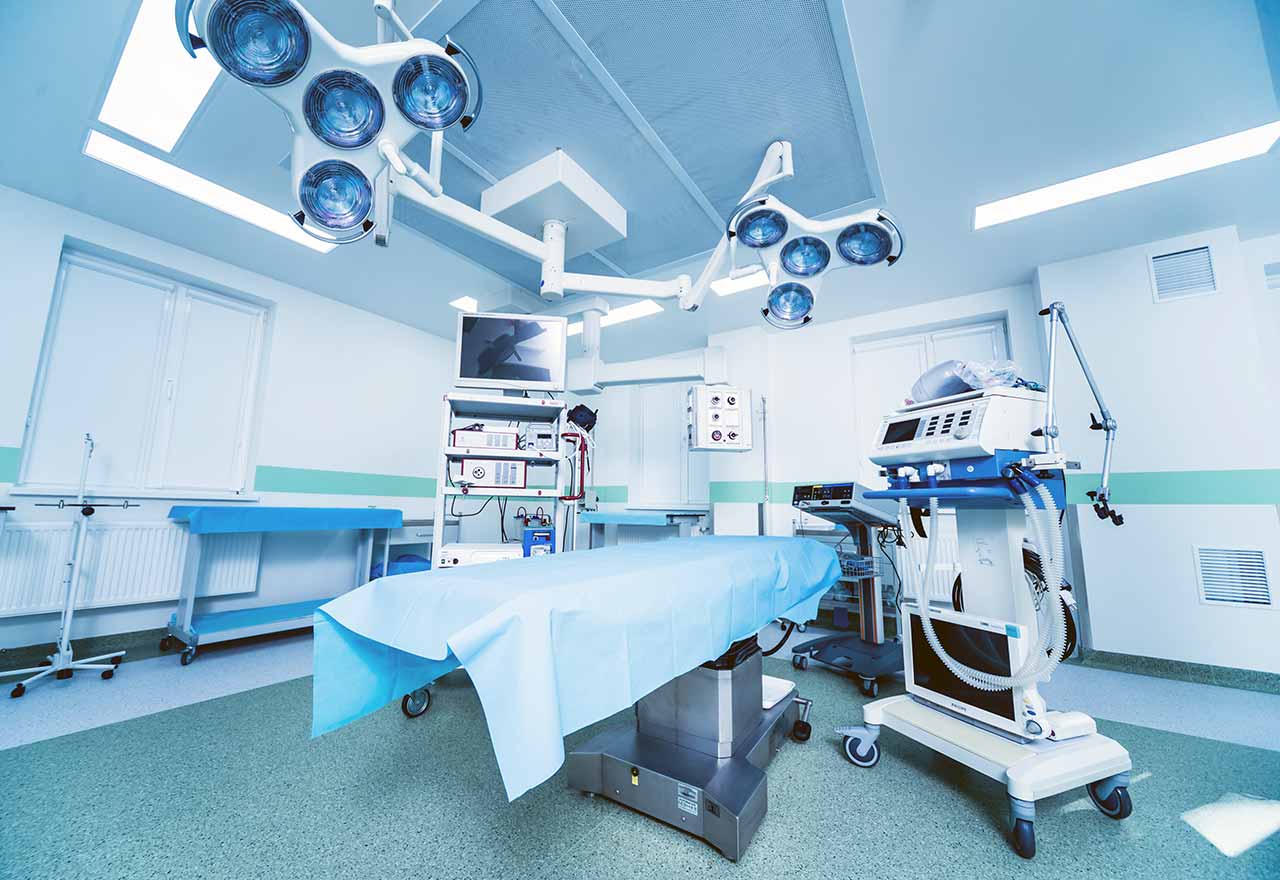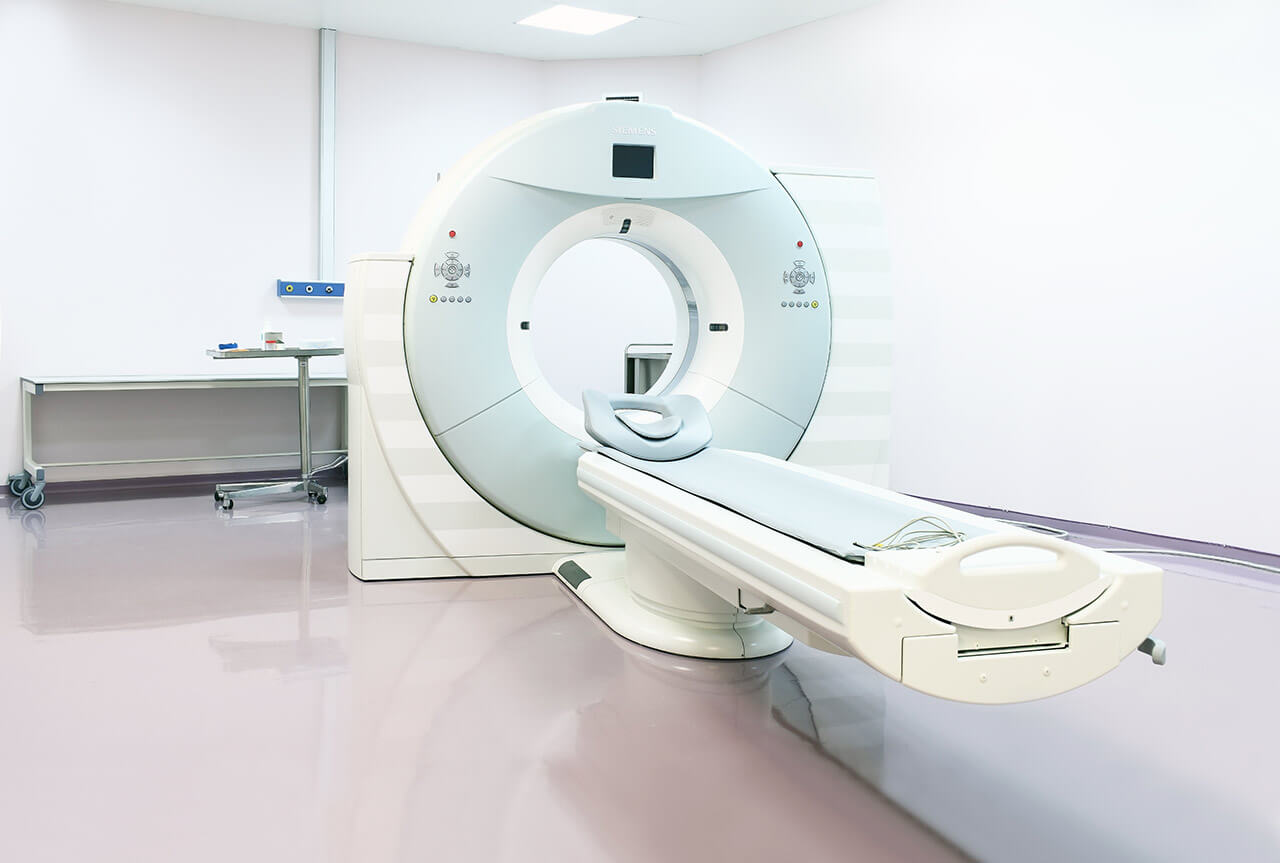
The program includes:
- Initial presentation in the clinic
- clinical history taking
- review of medical records
- physical examination
- laboratory tests:
- complete blood count
- general urine analysis
- biochemical analysis of blood
- TSH-basal, fT3, fT4
- tumor markers
- inflammation indicators (CRP, ESR)
- indicators of blood coagulation
- abdominal ultrasound scan
- CT scan/MRI or PET-CT of abdomen
- preoperative care
- cytoreductive surgery to remove visible tumors
inside the abdomen and HIPEC - histological and immunohistochemical
examination of removed tissues - symptomatic treatment
- cost of essential medicines
- nursing services
- stay in the hospital with a full board
- accommodation in a 2-bedroom ward
- elaboration of further recommendations
How program is carried out
During the first visit, the physician will conduct a clinical examination and go through the results of the available diagnostic tests. After that, you will undergo the necessary additional examination, such as the assessment of liver and kidney function, ultrasound scan and tomography of the abdominal organs. Based on the results of the examination, the physician will choose the surgical technique and the type of anesthesia. After that, preparation according to the preoperative standard will start.
Cytoreductive surgery begins with general anesthesia. The intervention is performed as open surgery, i.e. through the incision in the anterior abdominal wall, so that the surgeon can carefully examine the peritoneum and the surface of the abdominal organs. The surgeon removes affected by the malignant process ovaries, areas of the peritoneum and metastases in other internal organs. This stage of the operation can take several hours, since the overall effectiveness of the treatment depends on the completeness of the malignant tissues removal.
At the next stage of the operation, the surgeon inserts several catheters into the abdominal cavity. Through the catheters, a heated solution of a chemotherapy drug is pumped inside. The special system maintains the required temperature (42-43 degrees Celsius), pressure and circulation rate of the medicinal solution. The solution mechanically flushes out blood clots and remnants of malignant tissues, and a heated chemotherapy drug destroys micrometastases in internal organs and lymph nodes (micrometastases can’t be detected by the naked eye).
After 1-1.5 hours, the chemotherapy drug is removed from the abdominal cavity and the abdominal cavity is washed with saline. After that, the surgeon removes the catheters and sutures the incision of the anterior abdominal wall.
After the completion of the operation, you will be transferred to the ward of the intensive care unit, under the round-the-clock supervision of doctors and nurses. In 1-3 days after the operation, your drains will be removed and you will be transferred to a regular ward for further recovery. The whole treatment takes 10-12 days on average.
Finally, the attending physician will evaluate the results of control examinations, schedule the date of discharge from the hospital and give you detailed recommendations for further follow-up and treatment.
Required documents
- Medical records
- MRI/CT scan (not older than 3 months)
- Biopsy results (if available)
Service
You may also book:
 BookingHealth Price from:
BookingHealth Price from:
About the department
The Department of Gynecology, Obstetrics and Mammology at the HELIOS University Hospital Wuppertal offers high-precision diagnostics and many modern treatments for women's health restoration. The team of the department's doctors specializes in the treatment of the full range of diseases of the female reproductive system and breast. The department is rightfully proud of its status as a certified Gynecologic Cancer Center and a certified Breast Cancer Center of the German Cancer Society (DKG) – only the leading medical facilities in Germany receive certificates of this society, the level of which corresponds to modern standards of European medicine. In most cases, surgical treatment of gynecologic diseases is carried out using minimally invasive techniques, which are the standard of modern surgery. In the course of cancer treatment, oncologists, radiologists, radiation therapists and other specialists are involved in the therapeutic process. In cooperation with gynecologists, they develop an optimal treatment regimen for the patient. An integral part of the department's clinical practice is the provision of obstetric services. Expectant mothers are provided with integrated management of pregnancy and high-quality postpartum care. There are 5 modern delivery rooms equipped with everything necessary for a successful and safe childbirth. The department's medical team works for the benefit of its patients, and also does everything possible to meet the needs and wishes of women as much as possible.
The department is headed by Prof. Dr. med. Markus Fleisch. The professor is a recognized expert in the professional medical community and has been conducting successful clinical practice for many years. Dr. Fleisch underwent professional training in America, and also worked for a long time at the University Hospital Duesseldorf – one of the best in Germany.
The primary focus of the department's gynecologists is to provide medical care to women suffering from cancer. The medical facility specializes in the treatment of uterine and cervical cancers, ovarian, endometrial, vulvar, vaginal and fallopian tube cancers. The patients with the above-mentioned oncological diseases receive medical care in a highly specialized center certified by the German Cancer Society (DKG). The patients' health is in the safe hands of the interdisciplinary team of highly qualified doctors: gynecologists, oncologists, surgeons, urologists, radiation therapists, psychologists. The specialists regularly meet at tumor boards to develop optimal therapeutic regimens based on the stage of the oncological process, the presence or absence of metastases, the patient's age and other factors. When treating cancer in women of childbearing age, special attention is paid to the preservation of reproductive function. The successful treatment of gynecologic cancer mostly requires surgical resection of the malignant tumor. The department's surgeons always give preference to minimally invasive surgery, which excludes severe trauma to the skin and soft tissues, and surgical access is provided through one or several skin incisions 1-1,5 cm in size. The department's surgeons have vast experience in performing such interventions, so the patients can be confident that their health is in good hands. In most cases, surgery is the first-line treatment, but additional therapeutic procedures are required as well, in particular, chemotherapy and/or radiation therapy. In collaboration with radiation therapists, cancer patients receive such innovative types of irradiation as intraoperative radiation therapy and brachytherapy (internal irradiation). With appropriate clinical indications, immunotherapy, hormonal therapy and other types of treatment can be carried out as well.
Mammology occupies an important place in the department's clinical practice. The doctors specializing in this medical field admit patients with benign and malignant breast diseases. Due to the fact that breast cancer is one of the most common pathologies in women, experts pay key attention to the treatment of this particular oncological disease. Women with suspected breast cancer undergo diagnostics and treatment in a specialized center certified in accordance with the requirements of the German Cancer Society (DKG). The certificate confirms the use of modern approaches to breast cancer treatment and high treatment success rates. The therapeutic process begins with comprehensive diagnostics, including 3D and 4D ultrasound scans, mammography, tomosynthesis, biopsy with further examination of the tissue sample. If the diagnostic results confirm the presence of cancer in a woman, further therapeutic measures are determined at the interdisciplinary tumor boards. As a rule, the first and the main part of the treatment regimen is the surgical removal of the malignant tumor. In most cases, the department's specialists perform organ-preserving surgery, but at the advanced stages of cancer, total breast removal (mastectomy) is often required. The department maintains close cooperation with plastic surgeons who have a wide range of techniques to restore the aesthetic appearance of the breast after breast resection. To successfully fight breast cancer, conservative therapies are also required, including chemotherapy, radiation therapy, antibody therapy, etc. All therapeutic procedures are prescribed strictly on an individual basis, based on the particular clinical case.
The department also provides high quality obstetric services. The specialists in this field have vast experience in the pregnancy management, including multiple pregnancies and high-risk pregnancies, childbirth and caring for the mother and baby after childbirth. The department has five modern delivery rooms, an operating room for C-sections and an intensive care unit for newborns and premature babies. Childbirth is one of the most amazing and happy events in a woman's life, so the team of the department's obstetricians makes sure that everything goes at the highest level.
The department's range of medical services includes:
- Gynecology
- Diagnostics and treatment of benign gynecologic diseases
- Uterine fibroids
- Endometriosis
- Cervical dysplasia
- Abnormal uterine bleeding
- Chronic pain in the lower abdomen
- Urogynecologic diseases: urinary incontinence and pelvic organ prolapse
- Diagnostics and treatment of malignant gynecologic diseases
- Uterine cancer
- Cervical cancer
- Ovarian cancer
- Endometrial cancer
- Vulvar cancer
- Vaginal cancer
- Fallopian tube cancer
- Diagnostics and treatment of benign gynecologic diseases
- Mammology
- Diagnostics and treatment of benign breast diseases
- Mastitis
- Cyst
- Fibroadenoma
- Diagnostics and treatment of malignant breast diseases
- Breast cancer
- Diagnostics and treatment of benign breast diseases
- Obstetrics
- Integrated management of pregnancy, including multiple pregnancies and high-risk pregnancies
- Childbirth – vaginal delivery and C-section
- Postnatal care for mother and newborn
- Other medical services
The department's therapeutic options include:
- Conservative treatment
- Drug therapy
- Chemotherapy
- Radiation therapy, including intraoperative radiation therapy and brachytherapy
- Antibody therapy
- Palliative care
- Surgery
- Minimally invasive surgery for diseases of the female reproductive system and breast
- Organ-preserving surgery (in breast cancer treatment)
- Plastic reconstructive surgery after breast resection
- Other conservative and surgical treatments
Curriculum vitae
University Education and Professional Career
- 1992 - 1998 Study of Human Medicine at the Heinrich Heine University Duesseldorf.
- 1998 - 2002 Internship, Department of General and Abdominal Surgery, Hospital Barmen.
- 2002 - 2004 Research Fellow, Department of Gynecology at the University Hospital Duesseldorf.
- 2004 Admission to the Arizona Board of Medical Examiners, USA.
- 2004 - 2005 Resident in the Department of Obstetrics and Gynecology, Section of Gynecologic Oncology, University Medical Center Tucson, Arizona.
- 2005 - 2006 Research Scholarship at Lawrence Berkeley National Laboratory, USA: Invited Research Fellow, Department of Oncology, Ann Arbor, USA.
- 2008 Board certification in Gynecology and Obstetrics.
- Since 2008 Senior Physician in the Department of Gynecology at the University Hospital Duesseldorf.
- 2010 Deputy Head Physician in the Department of Gynecology at the University Hospital Duesseldorf.
- 2012 - 2013 Acting Head Physician and Member of the Department of the Heinrich Heine University Duesseldorf.
- 2014 Extraordinary Professorship for Gynecology and Obstetrics.
- Since March 1, 2016 Head Physician of the Department of Gynecology, Obstetrics and Mammology at the HELIOS University Hospital Wuppertal.
Clinical Interests
- Gynecologic Oncology.
- Minimally Invasive Surgery in Gynecology.
- Obstetrics.
Memberships in Professional Societies
- German Society of Gynaecology and Obstetrics (DGGG).
Photo of the doctor: (c) Helios Universitätsklinikum Wuppertal
About hospital
According to the prestigious Focus magazine, the HELIOS University Hospital Wuppertal ranks among the top medical facilities in Germany!
The hospital rightfully enjoys the status of the maximum care medical facility and provides its high-quality services in all modern fields of medicine. The hospital operates on the basis of the Witten/Herdecke University, which was opened in 1982 and today is considered one of the best in Germany. Thus, many head physicians of the medical complex are in charge of the corresponding department at the university, which contributes to the close intertwining of research activities and clinical practice. The hospital has long traditions and its own values – the main goal of doctors is to provide comprehensive medical care focused not only on curing the disease, but also on the patient's personal needs.
The hospital has 1,000 beds. The doctors of the medical facility admit more than 50,000 inpatients annually. In addition, more than 100,000 outpatients undergo diagnostic and therapeutic procedures. Such high attendance rates speak for themselves and are undeniable proof of the high-quality medical service of the European level. The medical staff of the hospital has more than 2,500 employees, whose main task is to restore the patient's health and provide him with a decent quality of life.
The hospital has more than 26 specialized departments, as well as many narrowly focused centers and institutes dealing with the treatment of patients suffering from a particular group of diseases: Breast Center, Cancer Center, Cardiology Center, Trauma Center, Spine Center and others. The primary clinical focus of the medical center is cancer treatment.
For more than 25 years, the hospital has been running a special quality management system for medical care, which regulates the aspects of work of the medical staff, compliance with hygiene and safety standards during diagnostics and treatment. Consequently, patients can be sure that their health is in the safe hands of true professionals who work in accordance with the latest medical standards.
Special attention should be paid to the honors of the hospital for excellent patient care. The medical complex has quality certificates from the German Cancer Society (DKG), the German Trauma Society (DGU), the German Cardiac Society (DGK), the German Stroke Society (DSG) and other professional German societies.
Photo: (с) depositphotos
Accommodation in hospital
Patients rooms
The patients of the HELIOS University Hospital Wuppertal live in comfortable single, double, triple and quadruple rooms. Each patient room has an ensuite bathroom with shower and toilet. The standard room furnishings include a comfortable automatically adjustable bed, a bedside table, a wardrobe, a TV and a telephone. The hospital has Wi-Fi (free). For maximum patient comfort, there is a nurse call device on the bedside table. This device allows the patient to control the TV, radio, turn on or off the lights, and adjust the position of the bed.
The patients of the hospital are also offered accommodation in enhanced-comfort rooms. These rooms additionally provide a safe and a free minibar with soft drinks. The enhanced-comfort rooms also have a spacious bathroom with hairdryer, bathrobe, towels and toiletries.
Meals and Menus
The patients of the hospital are offered three meals a day: breakfast, lunch and dinner. The menu offers a variety of delicious dishes to suit all tastes, including dietary and vegetarian options.
The hospital also has a bistro where one can taste delicious hot dishes, cold snacks, desserts, as well as a cup of tea, coffee or refreshments.
The patients staying in enhanced-comfort rooms are offered a separate menu that includes a wider and more refined range of dishes. In addition, fresh fruit, tea, coffee and desserts are delivered to the patient room every day, if desired.
Further details
Standard rooms include:
Religion
The religious services are available upon request.
Accompanying person
During an inpatient program, your accompanying person can stay with you in the patient room or in the hotel of your choice.
Hotel
During an outpatient program, you can stay in the hotel of your choice. Our managers will help you choose the most suitable options.




